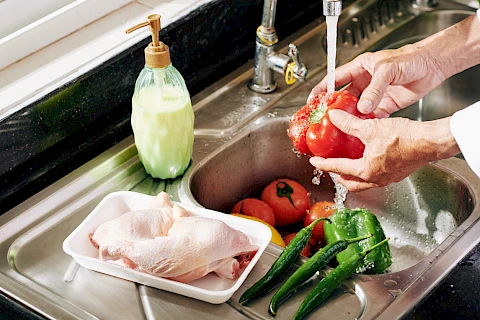
September is National Food Safety Education Month, a great time to focus on keeping our kitchens safe, especially for seniors. As we age, our bodies undergo changes that can make us more vulnerable to foodborne illnesses. This can lead to serious health problems.
Food Safety Risks for Seniors
As we get older, our immune systems weaken, making it harder to fight off infections. This makes the elderly more susceptible to getting sick from food that is not handled properly. Common foodborne illnesses like salmonella, E. coli, and listeria can be very dangerous for older adults.
Proper Food Storage
Proper food storage is essential to keep food fresh and safe. Keep the refrigerator at or below 40°F and the freezer at 0°F or lower. Use a refrigerator thermometer to ensure the right temperature. Cooked leftovers should be eaten within 3-4 days, while raw meat, poultry, and seafood should only be stored for 1-2 days. You need to label foods with the date they were prepared before storing them. This helps keep track of how long foods have been stored and prevents eating spoiled food.
Safe Food Handling Techniques
Handling food safely is as important as storing it properly. Wash hands with soap and water for at least 20 seconds before and after handling food, and always after using the restroom, touching pets, or handling garbage. Keep raw meat, poultry, and seafood away from other foods, and use separate cutting boards and utensils for raw and cooked foods. Clean cutting boards, knives, and utensils with hot, soapy water after each use, and sanitize them regularly to prevent bacteria buildup.
Safe Food Preparation
Proper preparation ensures that food is safe to eat. Cook poultry to at least 165°F, ground meats to at least 160°F, and fish to 145°F. Use a food thermometer to check that foods reach a safe temperature by inserting it into the thickest part of the food without touching bone or gristle. Raw meat can present a real danger for seniors. When reheating leftovers, make sure they reach at least 165°F. Use a microwave-safe dish and stir the food to ensure even heating.
Special Considerations for Seniors
The elderly have unique needs when it comes to food safety. It's important to recognize signs of food spoilage by checking for unusual odors, colors, and textures. If food looks or smells off, it's better to throw it out. When preparing meals, adjust recipes for dietary restrictions. For example, use low-sodium alternatives if you have high blood pressure. Stay hydrated by drinking plenty of water, and avoid raw or undercooked foods like sushi, rare steak, or eggs with runny yolks.
Senior Helpers Tallahassee Can Help With Meal Planning and Prep
Safe cooking practices are vital for seniors to prevent foodborne illnesses. By understanding food safety risks, storing food properly, handling it with care, and preparing it correctly, seniors can enjoy their meals safely. We can assist with meal planning and food preparation for your elderly loved ones in Tallahassee, Crawfordville, Monticello, or Madison areas. Contact us at Senior Helpers Tallahassee.